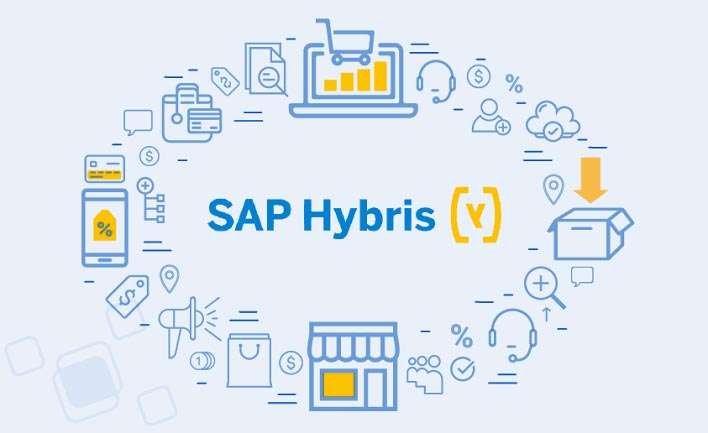What Is SAP Hybris and How Is It Used?

What Is SAP Hybris and How Is It Used?
In today’s digital economy, businesses need advancedplatforms to deliver seamless, personalized, and scalable customer experiences.As customer expectations rise and digital channels multiply, organizations facegrowing pressure to unify and streamline their commerce and engagementstrategies. SAP Hybris, now part of the SAP Customer Experience suite, offers apowerful set of tools to meet these evolving needs.
Introduction to SAP Hybris
SAP Hybris is a customer experience and commerce platformdeveloped by SAP, one of the world’s leading enterprise software providers.Originally launched as an e-commerce platform, Hybris has grown into a broadersolution that supports multiple aspects of digital commerce and customerengagement.
The platform enables businesses to manage content, commerce,marketing, sales, and customer service across digital and physical channels. Itis built for flexibility, scalability, and integration, which makes itparticularly suitable for enterprises with complex needs across multipleregions or customer types.
SAP Hybris helps companies deliver unified experiencesacross all touchpoints, from websites and mobile apps to call centers andphysical stores. It is widely used by organizations in retail,telecommunications, manufacturing, and financial services, among others.
Key Features of SAP Hybris
SAP Hybris offers a comprehensive suite of features designedto support omnichannel commerce and customer engagement. These features helpbusinesses centralize processes, improve agility, and personalize experiencesacross different channels.
1. Omnichannel Commerce
Businesses can provide consistent customer journeys acrossall sales and service channels. Whether a customer interacts through a mobileapp, website, in-store point of sale, or customer service center, SAP Hybrisensures that the experience is connected and responsive.
2. Product Content Management (PCM)
SAP Hybris includes a robust content management system fororganizing and maintaining product information. Businesses can manage productattributes, media assets, and descriptions in one place, ensuring that productdata remains consistent across platforms.
3. Order Management
The platform includes tools to manage the entire orderlifecycle, from cart to delivery. Businesses can coordinate inventory, processpayments, manage returns, and fulfill orders from multiple locations.
4. Personalization and Targeting
Using customer data, SAP Hybris enables businesses to createtailored content, promotions, and product recommendations. This personalizationis based on user behavior, preferences, purchase history, and other contextualinformation.
5. Integration Capabilities
SAP Hybris connects easily with SAP’s other systems,including ERP and CRM platforms. It also supports integration with third-partyapplications, enabling businesses to build a connected ecosystem.
6. B2B and B2C Functionality
The platform is built to support both business-to-businessand business-to-consumer models. It includes features such as customer-specificpricing, bulk ordering, and multi-level user roles for B2B scenarios.
7. Scalability and Performance
SAP Hybris is capable of handling high transaction volumesand supports global operations. It is designed to scale as businesses grow,making it a long-term solution for organizations with expansion plans.
Common Use Cases for SAP Hybris
Organizations use SAP Hybris to support a wide range ofbusiness needs, from managing e-commerce storefronts to streamlining customerservice operations.
1. Digital Commerce Platforms
SAP Hybris is widely used to build and operate onlinestores. It supports catalog management, secure transactions, responsive design,and localized experiences. Businesses can launch multilingual andmulti-currency sites that cater to global audiences.
2. Omnichannel Customer Experiences
With SAP Hybris, businesses can unify data and interactionsacross all channels. For example, a customer can browse a product online, addit to a wishlist, and complete the purchase in a physical store, with all datasynchronized in real time.
3. B2B Commerce Portals
Many companies use SAP Hybris to create B2B portals fordistributors, wholesalers, or partners. These portals offer customer-specificcatalogs, negotiated pricing, and advanced account management features.
4. Marketing and Campaign Management
Hybris provides marketing automation tools that allowbusinesses to run campaigns based on user segmentation, behavior, andpreferences. Campaigns can be delivered through email, push notifications, andon-site messages.
5. Customer Service Operations
The platform includes tools for managing service requests,returns, complaints, and support tickets. Customers can receive help throughchat, email, or phone while service agents access a full history ofinteractions.
6. Integration with SAP Solutions
For companies already using SAP ERP or SAP CRM, SAP Hybrisintegrates natively to create a unified business environment. Inventory data,pricing rules, and customer profiles can be shared across systems in real time.
Benefits of Using SAP Hybris
SAP Hybris brings together a wide array of capabilities thatsupport both business efficiency and customer satisfaction.
Enhanced Customer Experience
Businesses can deliver consistent, personalized experiencesacross all channels. Customer journeys are streamlined, making it easier toattract, engage, and retain users.
Scalability for Enterprise Growth
The platform supports large-scale operations, multipleregions, and high transaction volumes. It is a suitable choice for enterpriseswith global or complex business models.
Flexibility and Customization
SAP Hybris offers customizable modules and extensibleframeworks that adapt to specific business requirements. Businesses are notlimited by rigid templates or configurations.
Data-Driven Decision Making
Built-in analytics tools allow businesses to track customerbehavior, campaign effectiveness, and sales performance. These insights caninform decisions in marketing, inventory, and product development.
Unified Business Ecosystem
SAP Hybris integrates with enterprise systems to create aseamless flow of data across departments. This leads to better coordination,fewer data silos, and faster decision-making.
Challenges in SAP Hybris Implementation
While SAP Hybris offers a robust feature set, itsimplementation can involve some complexity.
System Complexity
The platform includes many features and configurationoptions. A well-planned implementation strategy is needed to avoid unnecessarycomplications.
Technical Expertise
Deploying and maintaining SAP Hybris requires specializedskills in system architecture, integration, and development. Businesses mayneed to invest in training or hire experienced professionals.
Cost Considerations
The cost of licenses, infrastructure, and professionalservices can be high, especially for smaller companies. Budget planning iscritical for a successful rollout.
Integration Requirements
To fully realize the benefits of SAP Hybris, it must beconnected with existing systems such as ERP, CRM, or logistics tools. Thisrequires careful planning and technical oversight.
SAP Hybris is a comprehensive platform designed to helpbusinesses manage and deliver exceptional digital commerce and customerexperiences. Its modular architecture, integration capabilities, and supportfor both B2B and B2C models make it suitable for organizations with diverse andcomplex requirements.
By centralizing key functions such as product management,order processing, marketing, and customer service, SAP Hybris enablesbusinesses to deliver seamless and personalized experiences across channels.Though the platform comes with implementation challenges, its long-term valuein terms of scalability, customer satisfaction, and operational efficiencymakes it a compelling choice for enterprise digital transformation.
For businesses aiming to stay competitive in the digitalage, SAP Hybris offers the tools and framework needed to create a unified,data-driven, and customer-centric strategy.
Nvizion helps businesses implement and optimize SAP Hybris to create seamless, scalable digital commerce experiences. Our team customizes solutions to fit unique business needs, ensuring smooth integration with existing ERP, CRM, and third-party systems. We enable omnichannel strategies, personalized customer journeys, and data-driven marketing using Hybris’s full capabilities. With end-to-end support from planning to post-launch, Nvizion ensures your platform performs at its best. Partnering with us means faster go-to-market, better customer engagement, and long-term digital growth.
